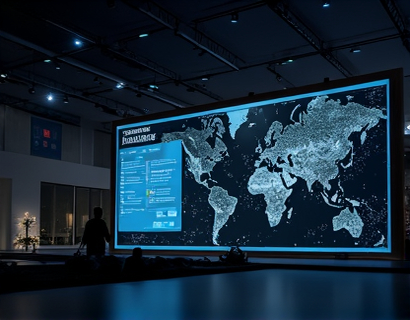Next-Gen QR Code Technology: Elevating Business and Social Media Engagement for Modern Enterprises
In the rapidly evolving digital landscape, businesses are constantly seeking innovative ways to engage with their audience. One of the most transformative tools in this quest is the next-generation QR code technology. Unlike traditional QR codes, which often serve a singular purpose, next-gen QR codes offer customizable and intuitive solutions that streamline information sharing and enhance customer interaction. This article explores how these advanced QR codes are revolutionizing business and social media engagement, making them essential for brands looking to enhance their digital presence and foster deeper connections with their audience.
The Evolution of QR Codes
QR codes, or Quick Response codes, were first developed in 1994 for the automotive industry in Japan. Initially, they were used to track vehicle parts during manufacturing. However, as smartphones became ubiquitous, QR codes found their way into marketing and advertising. Traditional QR codes typically link to static information, such as a website or a product page. While they were a significant advancement at the time, their limitations became apparent as businesses sought more dynamic engagement methods.
Next-gen QR codes have emerged as a solution to these limitations. They are designed to be more versatile, allowing businesses to create interactive experiences that can be tailored to their specific needs. This evolution is crucial for modern enterprises that aim to capture the attention of tech-savvy consumers who expect seamless and engaging interactions.
Customizability: A Key Feature of Next-Gen QR Codes
One of the standout features of next-gen QR codes is their customizability. Businesses can design QR codes that reflect their brand identity, incorporating colors, logos, and unique shapes. This level of personalization not only enhances brand recognition but also encourages users to engage with the code. A visually appealing QR code is more likely to attract attention and prompt users to scan it, leading to increased interaction.
Moreover, customizable QR codes can be linked to various types of content, including videos, social media profiles, promotional offers, and more. This flexibility allows businesses to create targeted campaigns that resonate with their audience. For instance, a restaurant could use a QR code on its menu that links to a video showcasing the chef preparing a signature dish, enticing customers to try it out.
Intuitive Tools for Streamlined Information Sharing
Next-gen QR codes come equipped with intuitive tools that simplify the process of information sharing. Businesses can easily generate and manage QR codes through user-friendly platforms, eliminating the need for technical expertise. This accessibility empowers companies of all sizes to leverage QR codes in their marketing strategies.
Additionally, these platforms often provide analytics features that allow businesses to track the performance of their QR codes. By analyzing data such as scan rates, user demographics, and engagement levels, companies can gain valuable insights into their audience's behavior. This information can inform future marketing efforts, enabling businesses to refine their strategies and improve customer engagement.
Enhancing Customer Interaction
Next-gen QR codes are not just about sharing information; they are also about enhancing customer interaction. By providing a seamless way for users to access content, businesses can create a more engaging experience. For example, a retail store could place QR codes on product displays that link to customer reviews, detailed product information, or even augmented reality experiences. This interactivity not only informs customers but also encourages them to spend more time engaging with the brand.
Furthermore, next-gen QR codes can facilitate direct communication between businesses and their customers. For instance, a QR code on a product packaging could link to a feedback form, allowing customers to share their thoughts and experiences. This two-way communication fosters a sense of community and loyalty, as customers feel their opinions are valued.
Boosting Social Media Engagement
Social media is a powerful tool for businesses looking to connect with their audience, and next-gen QR codes can significantly enhance social media engagement. By linking QR codes to social media profiles, businesses can drive traffic to their platforms and encourage users to follow, like, and share their content.
For example, a brand could create a QR code that links directly to its Instagram page, making it easy for customers to follow them with a simple scan. Additionally, businesses can use QR codes to promote specific social media campaigns or contests, encouraging users to participate and share their experiences online. This not only increases brand visibility but also fosters a sense of community among followers.
Real-World Applications of Next-Gen QR Codes
The versatility of next-gen QR codes allows for a wide range of applications across various industries. Here are some real-world examples of how businesses are leveraging this technology:
Retail
Retailers are using next-gen QR codes to enhance the shopping experience. For instance, a clothing store might place QR codes on clothing tags that link to styling tips or outfit inspiration. This not only provides added value to customers but also encourages them to explore more products.
Hospitality
In the hospitality industry, hotels and restaurants are utilizing QR codes to streamline operations. Guests can scan codes to access menus, make reservations, or even check in online. This contactless approach enhances convenience and safety, particularly in a post-pandemic world.
Events and Conferences
Next-gen QR codes are also making waves in the events and conferences sector. Attendees can scan codes to access schedules, speaker bios, and networking opportunities. This not only improves the attendee experience but also allows event organizers to gather valuable data on participant engagement.
Healthcare
In healthcare, next-gen QR codes are being used to provide patients with easy access to medical information. For example, a QR code on a prescription label could link to dosage instructions, potential side effects, and refill information, ensuring patients have all the information they need at their fingertips.
Challenges and Considerations
While next-gen QR codes offer numerous benefits, businesses must also consider potential challenges. One of the primary concerns is ensuring that users have the necessary technology to scan QR codes. Although smartphone penetration is high, not all consumers may be familiar with how to use QR codes effectively. Therefore, businesses should provide clear instructions on how to scan codes and what users can expect after scanning.
Additionally, businesses must prioritize security when implementing QR codes. Cybersecurity threats, such as phishing attacks, can occur if users are directed to malicious websites through QR codes. To mitigate this risk, businesses should use trusted platforms for generating QR codes and regularly monitor their performance to ensure they are functioning as intended.
The Future of QR Code Technology
The future of QR code technology looks promising, with advancements in augmented reality (AR) and artificial intelligence (AI) set to further enhance user experiences. For instance, businesses could integrate AR features into their QR codes, allowing users to visualize products in their own environment before making a purchase. This immersive experience could significantly influence buying decisions and drive sales.
Moreover, as consumer behavior continues to evolve, businesses will need to adapt their strategies to meet changing expectations. Next-gen QR codes will play a crucial role in this adaptation, providing the tools necessary for businesses to engage with their audience in meaningful ways.
Conclusion
Next-gen QR code technology is revolutionizing the way businesses engage with their audience, offering customizable and intuitive solutions that enhance information sharing and customer interaction. As brands strive to strengthen their digital presence and foster deeper connections with their audience, embracing this technology is essential. By leveraging the unique features of next-gen QR codes, businesses can create dynamic and engaging experiences that resonate with consumers, ultimately driving growth and success in the modern digital landscape.










































